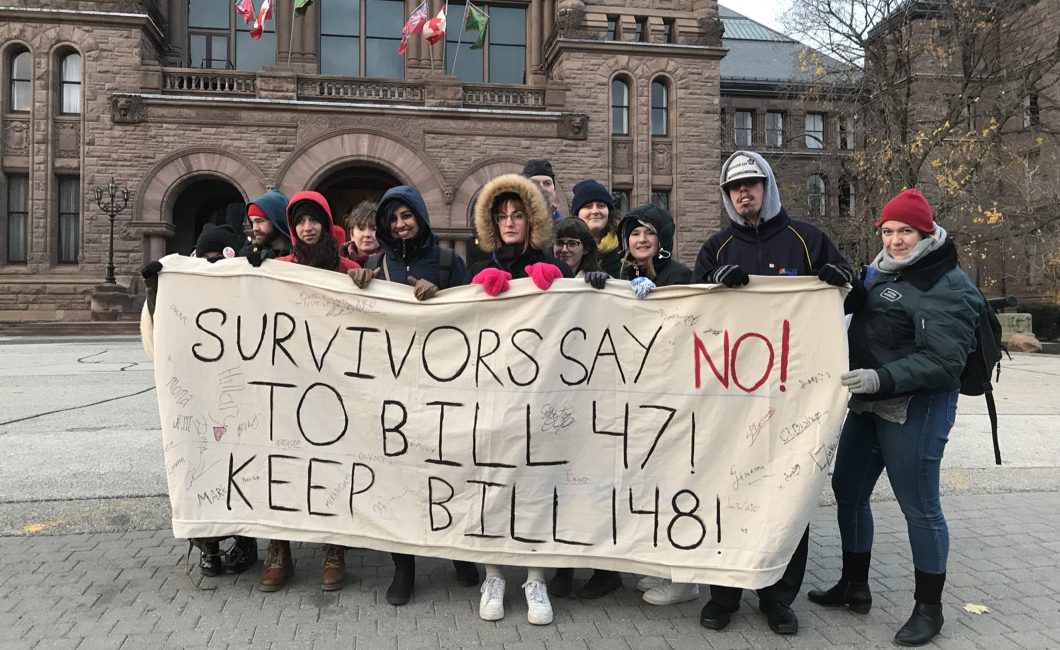Bill 148 states victims of domestic or sexual violence can receive job-protected leave. By law, a person is entitled to 10 days or 15 weeks in a calendar year time off when an employee or an employee’s children have experienced domestic or sexual violence. The first five days in a calendar year are paid and the rest are not paid.
Katie Bishop is a woman living in downtown Toronto, working a full-time job, and a sexual violence survivor. Bishop is personally dealing with her symptoms from sexual violence. She needed Bill 148, the Employment Act to help her during the hardest time in her life.
“I found out that there were five days of paid leave for survivors. I tried to access them through my work, I was denied these five days off, “ Bishop said. “I was really inspired to try to expend accessible and workplace accommodations for both sexual and domestic violence. I want to bring awareness to this issue.”
On Saturday Nov. 10 in front of the Legislative Assembly of Ontario, Bishop organized a protest to stop the passing of Bill 47. Calling it “Bill 148 for Survivors”, the protest was peaceful but small, due to the cold weather.
Bill 47 repeals many provisions from the previous Liberal government’s Fair Workplaces, Better Jobs Act, 2017 (Bill 148). While updating the Employment Act doesn’t change or improve the conditions of sexual violence survivors in Ontario, it does impact other things in a survivor’s life.
“If you are going to support survivors of domestic and sexual violence and gender-based violence, it’s hypocritical to say you can keep these five days and we going to trap you in poverty. Trap you in these conditions that create violence,” Bishop said. “That’s why I organized this.”

Katie Bishop speaking on Saturday, Nov 10, 2018 (BREE-ANN GITTENS/ TORONTO OBSERVER)
The Progressive Conservative government announced it would introduce Bill 47 on Oct. 23, 2018.
Many supporters came out Saturday to lend their voices and support sexual violence survivors in Toronto. Coco Lee has a friend who is a sexual violence survivor.
“The Making Ontario Open for Business Act is deeply exploiting and aggressive,” Lee said. “It can an intensely negative impact for all people and impact the most vulnerable among us, survivor, women, migrants, and people trying to get by.”
“People should have access to time off,” Lee said. “It creates a system where people put work above themselves and I don’t think we should live in that society anymore.”

Supporters signing their names on Bill 148 banner (BREE-ANN GITTENS/TORONTO OBSERVER)
While Bill 47 is preserving paid leave for victims of domestic and sexual violence, it makes accessing other kinds of leave, such as personal emergency leave, a bit harder, according to Christie Adhikary, outreach and advocacy coordinator at Bad Subject, a non-profit organization.
“This Bill also allows employers to require evidence from employees to prove that they are entitled to taking a personal emergency leave, including demanding medical notes from a health practitioner,” Adhikary said. “This is unrealistic and insensitive towards survivors of sexual violence! It requires survivors to have to provide evidence for their assault to their employers just so they don’t lose their job for wanting a much-needed leave.”

Bill 47 could go to affect as early as Jan. 1, 2019.
“As a concerned citizen, a woman and an employee, I disagree with the policies the Ford government is proposing,” Adhikary said. “Passing Bill 47 and repealing many important components of Bill 148 will create a work culture where employees will become more vulnerable to exploitation, particularly those who are already marginalized, like minimum wage workers and those who are experiencing domestic or sexual violence.”


